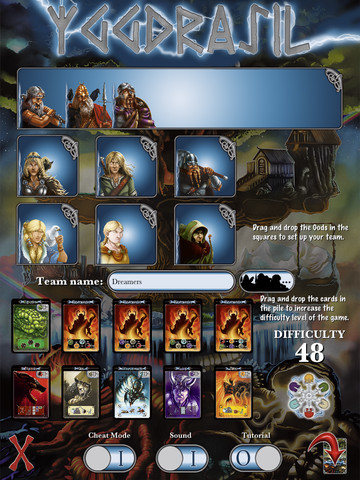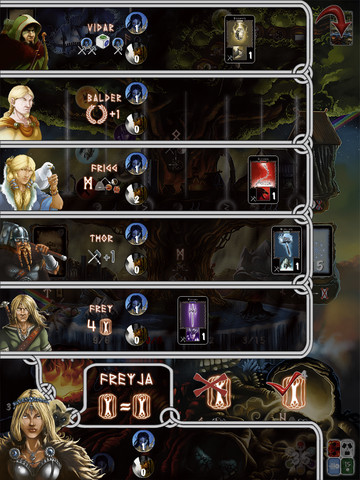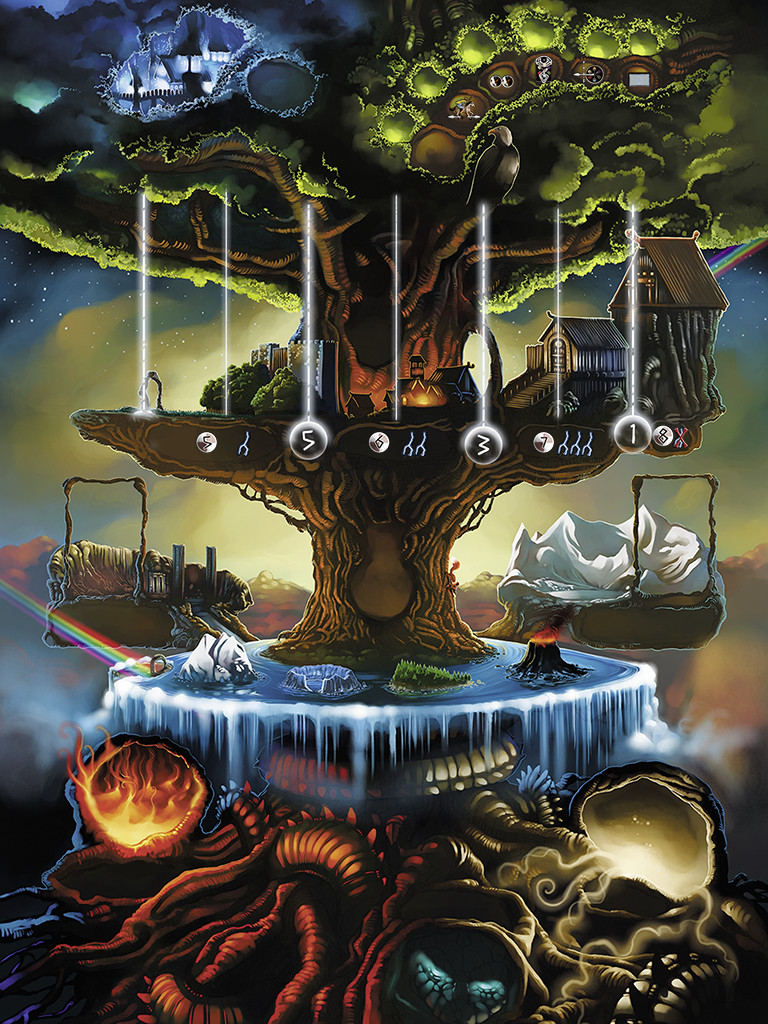Yggdrasil is a
board game that has gained a cult following for its interesting
inspiration (Norse mythology) and being one of the few
cooperative board games out there. (Cooperative board games,
for the uninitiated is where all players work together for a
mutual goal and either all win or lose). Interestingly enough,
Yggdrasil the board game and the iPad game are released by
Ludonaute, a young french outfit. This allows a faithful
conversion to the iPad but does pose certain problems as can be
seen later.

As mentioned before, Yggdrasil takes its name and inspiration
from Norse Mythology where the great Ash tree Yggdrasil harbours
the different worlds of existence. The evil enemies (Nidhogg,
Surt, Heimdall, Fenrir, Jormungand, Loki) are advancing on
Odinís House and you take control of six gods as you try to
fight them off. If the enemies reach Odinís House (or a certain
number make it past some points along the way), they will bring
on Ragnarok and the end of the world. As each enemy advances,
you use the active god to perform three actions in different
worlds. You can get the Valkyrie to reap viking souls from the
islands underneath that you can then use during your die roll
against the enemies. You can get the Elves to forge a weapon
which can be added onto die rolls. You can try to defeat an
enemy and make it move a step backwards. There are nine actions
in total and can be generally categorised as gathering items to
affect die rolls, defeating enemies, trading amongst the gods or
the preparation of these actions.
Each enemy will bring with them their own special actions as
they move forward. Fenrir needs to be calmed before any other
actions can be taken, wasting your precious turns for each
unsuccessful attempt. Nidhogg advances the furthest-behind
enemy along. Loki enlists the power of the Giants and each
Giant has its own debilitating powers that need to be defeated.
The enemies do get stronger as they advance so it is
advantageous to try to stop enemies advancing too far along as
they become too powerful.

As far as board game conversions go, Yggdrasil is eye-catching
and matches the board game perfectly, a testament to the care
that Ludonaute have put into making an accurate reproduction.
The game though looks great and follows the art of the board
game closely. Yggdrasil runs through the centre of the screen,
its branches holding up the world of the elves and Odinís House,
the islands running around its trunk and the worlds of fire and
the dead tangled around its roots. The screen perfectly matches
the beautifully painted board. A lot of the statuses are
represented by symbols (for instance, each of the
Godsí/Enemiesí/Giantsí special powers are represented by tiny
symbols as well as each of the actions). For a beginner to the
game, it serves as a very concise but terse display.
Each world has a hotspot onscreen that requires several taps to
accomplish an action. I just feel that a lot of the iPadís
intuitiveness is diminished as many opportunities for dragging
as well as saving on the number of taps is lost - the fluidity
of the game would have been much improved if not for the slight
awkwardness of the controls.

In terms of difficulty, Yggdrasil throws you into the thick of
it. The initial instructions are not particularly helpful as
they talk about bags, cards and tokens - it does seem that they
are based entirely on the instruction booklet for the board
game and possibly even a scan. The instructions are just not
intuitive, clear nor flowing. Luckily there is a tutorial, but
many users will need to resort to the internet to get a clearer
picture on how the game is played. The game is difficult to
master, as it does require constant population control of the
islands, careful use of each of the Gods and their special
powers and overcoming the different enemies/giants as they pop
up. I thought the game was pretty difficult to master but still
very entertaining. You do get the feeling, as Ragnarok
approaches, as the enemies get stronger and as the Giants come
out that it is the end of the world, with the weight of the
world against you, it gets more and more difficult to find the
best action to take.
Difficulty can be increased by adding more enemy cards to the
pile and you can also unlock different Gods (equivalent to an
expansion pack in the board game) after a few wins. Due to the
steep learning curve, Yggdrasil will not be to everyoneís taste
and does require a lot of patience. It does reward though with
one of the better hard-to-master thinking-manís board games out
there. Although for the impatient amongst you, it will punish.